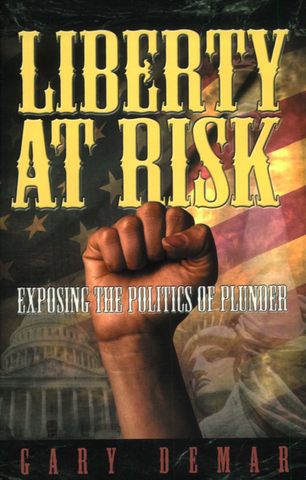When my oldest son was about four, we were at the check-out line at a Blockbuster video store when he noticed a display promoting a new video release of The Godfather. “Dad, are these movies about God?” he asked. A reasonable question for a four-year-old given the title and his always curious nature. Knowing that he would not care to hear a long retelling of the plot, I summed up the storyline by telling him that The Godfather saga was about an alternate form of government. The man standing behind us overheard our conversation and made the following comment. “I never thought of it that way, but you’re right. Don Corleone is a lot like today’s politicians. He’s the man in charge. He grants political favors. He makes and enforces laws. He even collects taxes. The Mafia is a government.”
Five Points of Government
Vito Corleone began his crime-boss career by working outside the political system and the accepted conventions of morality and law by developing a parallel but counterfeit government. His organization and his governing principles had the five necessary characteristics that make up a functioning governmental structure:
- Sovereignty: Who’s in charge? (Don Vito Corleone.)
2. Hierarchy: To whom do I report? (Clemenza, Tesio, “buffers.”)
3. Law: What are the rules? (Don’t go against “the family.”)
4. Positive and Negative Sanctions: What happens if I keep/break the rules? (Positive sanctions: advancement, a piece of the action, your own “family.” Negative sanctions: a bullet in the eye, a bullet in the back of the head, a bullet behind the ear, a horse head in your bed, strangulation, sleep with the fishes.)
5. Continuity: Is there a future? (Maintain and perpetuate “the family” at all costs.)
The government of the Godfather lacked one thing: legitimacy, the most important factor in establishing confidence, continuity, liberty, and justice in any form of government. But even without legal legitimacy, the Godfather’s government worked at various levels because it supplied a service to the community. It dealt with heavy-handed criminal rivals, solved problems for the politically disconnected, and granted favors to the dissatisfied, disillusioned, and disenfranchised. People turned to the Godfather out of hopelessness. For these people, the government of the Godfather was considered salvific. The Don was seen as a benevolent dictator. In reality, the Godfather’s government was the exercise of raw and unregulated power with the claim that it was for the good of the people and the community.
In the movie’s opening scene, Amerigo Bonasera, a patriotic and loyal Italian American, tells Don Corleone how he and his wife sat in a New York Criminal Courtroom and watched as they saw justice slip away from them. The judge described Bonasera’s daughter’s attackers as “the worst kind of degenerates… wild beasts.” Amerigo agreed, muttering “animales” under his breath. They had savagely beaten his daughter in their failed attempt to rape her, nearly killing her in the process. But then he heard the words: “Suspended sentence.” The judge had let them go. No punishment. No justice. No satisfaction. Bonasera swore vengeance. But how? Mario Puzo, the author of the best-selling Godfather novel, describes what happens next:
All his years in America, Amerigo Bonasera had trusted in law and order. And he prospered thereby. Now, though his brain smoked with hatred, though wild visions of buying a gun and killing the two young men jangled the very bones of his skull, Bonasera turned to his still uncomprehending wife and explained to her, “They have made fools of us.” He paused and then made his decision, no longer fearing the cost. “For justice we must go on our knees to Don Corleone.”[1]
Bonasera’s desperation sets the tone for the rest of the book and film and encapsulates the meaning of the Godfather’s governmental role. “Francis Ford Coppola and Puzo understood the need to show the alternate moral universe of the mafia,”[2] a competing and somewhat competent governmental organization with religious overtones. The Godfather was a sacred yet unofficial position in the community. It would take the humbled position of penitents — “on their knees” they approach kissing his hand like that of the Pope — to seek his forgiveness for not coming to him first as the true dispenser of justice. The goal of the Godfather is for the undertaker to change his loyalty from the government that betrayed him to the only government that can save him. Paul Rahe’s comments are significant:
In his novel, Puzo brings this home to his readers by conferring on the undertaker the name “Amerigo,” that of the Italian after whom America was named, and by giving him the surname “Bonasera,” which is Italian for “Good night.” In agreeing to accept Don Corleone’s “gift” and to become his “friend,” Amerigo Bonasera says “good night” to America. In pondering this even, we may wish to reflect on the fact that in German Gift is the word for poison.[3]
The Godfather’s government was considered to be good by so many because it granted favors, dispensing what many wanted to believe was justice when it could not be obtained in city courts or the streets. Legitimacy was not an immediate issue as long as the people received a benefit and general good was being performed, give or take a few broken legs and busted heads. Those under the counterfeit jurisdiction of the Don’s regime were willing to put up with paying extorted “protection money,” since most people understood the costs involved in running a government, even legitimate governments. They considered it a tax for promised services.
“For the Good of the People”
The Godfather bought off police officers, politicians, and judges to amass power and extend the jurisdiction of his Family’s influence, all for the good of the people and the community. Those holding legitimate governmental positions benefited as well with financial kickbacks. The Don’s “cabinet officers” were uncompromisingly loyal. His wife was equally loyal and unquestioning of his methods. The Don never directly involved himself in implementing his corrupt but effective policies. He hired “buffers,” underlings, to carry out his edicts. An empire was created outside the law but with the protection of the law.
Don Corleone protected his interests by crushing any person or competing crime family that opposed his will. It wasn’t personal; it was business. Each recipient of the Don’s favor would carry a lifetime debt that one day might have to be repaid. And there were many people in his debt. Loyalty was rewarded; disloyalty was severely punished. The Godfather was a political predator masquerading as a benevolent governor of the people. The family business (government) had to be protected at all costs. Legacies were important. Power from the Don was passed on to the most competent son, ensuring the future of the family and its power and influence.
“Government Policy”
The predatory politics and violent methods of the Godfather are criminal. Everyone understands this. But what is considered criminal when practiced by the Godfather, all of a sudden becomes “government policy” in legislation coming from Washington. Lavish government spending programs and burdensome tax bills are legitimized by describing them as just, benevolent, fair, and good for the people. The rule of law (the Constitution) is often ignored and most often subverted to gain political power at the expense of personal freedom and liberty. Wealth is confiscated from the productive and transferred to the less productive in an attempt to buy votes. Vote buying becomes a means of increasing the scope of governmental power and legitimizes policies that can find no constitutional justification. As long as those in power offer the benefits that come with power, few people complain, except, of course, those who are being fleeced with ever-growing tax bills.
Paved with Good Intentions
The intention to do good becomes a destructive force when it keeps people in a condition of dependency. When George W. Bush proposed a tax cut for all wage earners in 2003, Alan M. Webber, founding editor of Fast Company magazine, presented the classic plunder-to-satisfy-the-wants-of-the-people worldview. “At the community level,” he wrote, “ordinary folks want jobs, they want benefits, and they want reassurance. This is the time, not for tax cuts, but for Democratic-style spending programs: temporary job creation, targeted public works expenditures, extended unemployment benefits.”[4] Weber believed that confiscating money from wage earners, passing it through a huge bureaucracy, and then distributing a lesser amount of money to the helpless masses is better than allowing wage earners to keep their money, save it, spend it, invest it, and spend it.
Real jobs are created, and fewer people remain dependent on the State when consumers make their own economic decisions. Webber believes that a complex and multifaceted economy is better managed by bureaucrats than by people who make countless economic decisions every day. The only ones who benefit from “public works expenditures” are the politicians who create the programs and those empowered to implement them. The losers are the productive members of society who are plundered and those who become dependent on confiscated wealth given to them in the name of compassion.
The majority of Americans do not understand the basic principles of government, especially as they relate to civil government. Even Christians are often ignorant of basic biblical principles related to how governments should function. Government is not evil. When practiced with wisdom and the restraints of a Constitution limiting its power to be an all-granting benefactor, the result is true freedom under God.

Liberty at Risk: Exposing the Politics of Plunder
Without a proper understanding of civil government’s biblical function and limited jurisdiction, Christians can be trapped into believing that civil government should promote policies beyond its designed purpose as long as they are for ‘the good of the people.’ This reasoning can lead many to choose security no matter what the cost to liberty.
















